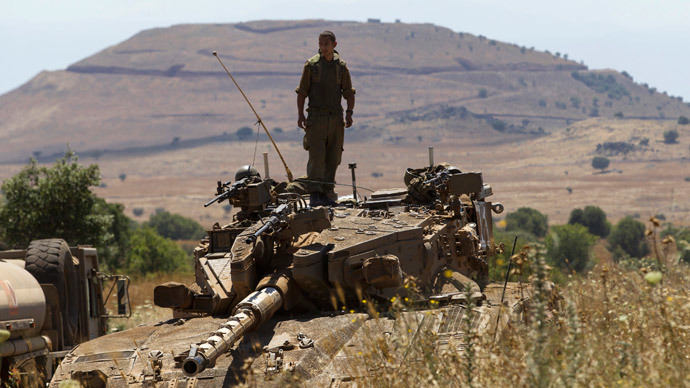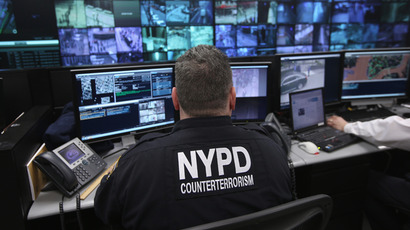Lessons of war: Swedish father demonized for taking video-gamer kids to real war zone

A Swedish father has incurred public rage after choosing an original way to explain to his video-gamer kids the realities of real-life war: by taking them to genuine war zones in occupied Syria and the West Bank.
The move no longer appears to be some miscalculated foolhardy decision, once you get acquainted with Carl-Magnus Helgegren – a journalist, university teacher, triathlete, DJ, and systems analyst who speaks five languages.
Helgegren, who shares custody of his children with their mother, wrote in a personal blog entry that a point comes when one simply isn’t able to control everything their kids see.
Leo and Frank, both aged 10, developed an interest for violent video games with a war theme, like many others, before they had reached the mandatory age of 16. So, they brought the issue up with Helgegren, touting the latest installment in the Call of Duty franchise, with its blood, guts, dramatic music, and ultra-realistic action.
"We were sitting at the dinner table last autumn, and my kids started telling me about this game they wanted to play, the latest Call of Duty game, and told me about the guns and missions,"the father told Sweden’s edition of The Local.
But how real could a video game get? Helgegren decided to make a bet with his two sons: they would visit a real war zone with him, feel the atmosphere, and engage with the people for whom survival or combat is an everyday reality – and upon return, would be able to play any video game they desired.
Although his sons didn’t believe him at first, Helgegren wasn’t kidding. Having decided that Iraq and Afghanistan were too dangerous at that point, he went for “the closest you can get to war on a tourist ticket” – occupied Golan Heights and the West Bank.
While staying with an Israeli family and enjoying the tourist sights in Jerusalem and other areas, the family’s real destinations were places like the Shufat refugee camp, where “people burned trash in the streets, and there was an illegal drug market right next to the school.”

“We went to a clinic where kids were being stitched up every single day because they had been hit in the head with the butt of a rifle,” Helgegren told the newspaper.
But Helgegren was thorough in his explanations; he tried to get across to his children that not all actions carried out by a soldier correspond with the thoughts and desires of a particular society, and that there are politics involved, especially where Israel is concerned.
Helgegren was in an especially suitable position to impart some knowledge of the realities of life onto his two kids, being a freelance journalist with prior experience in the Middle East.
He explained that it was “quite late in my life when I finally started to scratch the surface of what war really was...I thought I had a pretty good idea from television, but when I was 29 I realized I had absolutely no idea what war was. And my kids couldn’t explain it either.”
Upon return home, his noble intentions bore fruit; Frank and Leo no longer wanted to play Call of Duty. In fact, they wanted to go back to the Middle East one day.
På plats på #svt 08:15 är vi med i #godmorgonSverigepic.twitter.com/x7U6MTyz99
— Carl-M Helgegren (@cmhelg) August 6, 2014
But then came the flood of abuse and recommendations on how to be a better dad. While there were admittedly good wishes, many messages and tweets came from angry parents calling Helgegren “the worst parent in the world”who deserves to be “doused in napalm” for “traumatizing” his children.
“I didn’t really expect such a reaction,” he said, trying to justify in his mind the reasons that people’s sensibilities might have been offended in such a way as to provoke such dreadful responses.
“I think people didn't read thoroughly, so they thought we were just there recently, when there is a massive war going on...I also think that many people who posted these dreadful comments just believe that the Middle East is a total war zone at all times."
What was curious to Helgegren is that the harshest criticism emanated from people with no kids of their own.
He was quite incensed at one comment from a video game company rep which appeared to cloak his intentions in goodness only to then advertise how video games are better than both a holiday and playing pretend-war in the woods. One woman from the Swedish Games Industry told Sveriges Radio that video games posed “a much lower risk of getting hit in the head with a stone or falling over when you’re playing,” as she compared them to kids playing in a park.
Helgegren called this a “paid opinion” by a multi-billion dollar industry, something he sees as “absolutely ridiculous,” while continuing to stress that “video games in themselves are not bad.”
"But in Sweden and Europe we are very privileged. We have all this wealth and rights and social services. And with that comes the responsibility to educate ourselves and not just become zombies playing video games and consuming hamburgers," he explained.
What really made sense to him about his chosen method was the realization that Swedish parenting is a bit too disengaged from direct discipline because parents fear conflict.
"Sometimes they are afraid that their kids will be alienated socially and not have anything to talk about. Some say that video games are a good babysitter. But what it comes down to is that Swedish parents are too lenient."
Helgegren believes that such lax attitudes are a result of not being at war for a long time, which results in being disconnected from life’s true realities. He therefore told The Local that he is very “proud” of the trip the family took.













